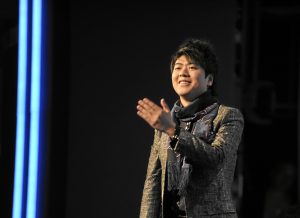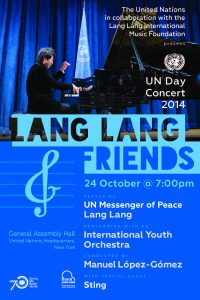Memo #314
By Hyung-Gu Lynn – hlynn [at] mail.ubc.ca
 Does celebrity diplomacy work? If so, based on what measures, why, how and for whom? In the afterglow of bravura passages powerful yet precise, arpeggios determined yet delicate, these questions arose, at least in one small corner of my brain. The United Nations Day concert in the General Assembly Hall in New York on October 24, which celebrated the 69th anniversary of the organization’s birth, was a finely orchestrated bricolage of gravitas, provided by the opening remarks of Secretary General Ban Ki-Moon that pointedly referred to the Ebola virus and numerous other complex challenges that face the UN; inspiration, via a philanthropic message of mentorship and peace embodied in the UN Youths Orchestra; and the glitter of celebrity, courtesy of the actor as emcee, Alec Baldwin, the burnished energy of guest performer Sting, and the singular virtuosity of the concert organizer and main performer, the renowned Chinese pianist Lang Lang.
Does celebrity diplomacy work? If so, based on what measures, why, how and for whom? In the afterglow of bravura passages powerful yet precise, arpeggios determined yet delicate, these questions arose, at least in one small corner of my brain. The United Nations Day concert in the General Assembly Hall in New York on October 24, which celebrated the 69th anniversary of the organization’s birth, was a finely orchestrated bricolage of gravitas, provided by the opening remarks of Secretary General Ban Ki-Moon that pointedly referred to the Ebola virus and numerous other complex challenges that face the UN; inspiration, via a philanthropic message of mentorship and peace embodied in the UN Youths Orchestra; and the glitter of celebrity, courtesy of the actor as emcee, Alec Baldwin, the burnished energy of guest performer Sting, and the singular virtuosity of the concert organizer and main performer, the renowned Chinese pianist Lang Lang.
Appointed a UN Messenger for Peace in 2013, Lang Lang is the first and only Chinese national among the current roster of thirteen such Messengers, and the third of Asian ethnicity, joining fellow classical music luminaries Yo-Yo Ma and Midori Goto. The UN Messenger for Peace program was established in 1997 under the previous Secretary General, Kofi Annan, to symbolize the entirety of the UN’s mission. Lang Lang’s nationality and ethnicity might be seen as key in light of earlier criticisms of bias in the roster of Messengers towards American stars despite the organization’s global mandate.
Celebrity diplomacy is a fast growing interdisciplinary area, with a range of views regarding its efficacy and no definitive answers to the questions posed at the start. But after attending the concert, it did strike me that rather than further focus on nationality, future analyses would benefit from finer distinction by fields (e.g. differences in how celebrity and virtuosity are established and maintained in music, film, sports, and literature), and a closer application of insights from musicology, largely related to performativity (i.e. differences in conventions and means of audience-performer interactions at concerts by genre of music, media, and performance style). Measuring the success of celebrity ambassadorship by only monetary amounts of donations to specific causes can overlook other forms of impact, such as raising the profile of a cause or inspiring a series of persistently lingering questions to which definitive answers flit teasingly out of reach.
About the Author:
Hyung-Gu Lynn is AECL/KEPCO Chair in Korean Research, Institute of Asian Research, The University of British Columbia and Editor of Pacific Affairs and the Asia Pacific Memo.

UN Messenger for Peace and renowned Chinese pianist Lang Lang pictured in 2010 (credit: World Economic Forum).
Links:
- Mark D. Alleyne, “The United Nations’ Celebrity Diplomacy,” SAIS Review of International Affairs 25:1 (2005)
- Andrew F. Cooper, Celebrity Diplomacy (Boulder: Paradigm, 2008)
- Evan Mitchell, “In defense of Lang Lang (sort of): Pianists and stage persona,” Bachtrack (January 2014)
- Christopher Small, Musicking: The Meanings of Performing and Listening (Hanover: Wesleyan University Press, 1998)
- Mark Wheeler, “Celebrity Diplomacy: United Nations’ Goodwill Ambassadors and Messengers of Peace,” Celebrity Studies 2:1 (2011)
Related Memos:
See our other memos on Global Topics.

Comments are closed, but trackbacks and pingbacks are open.